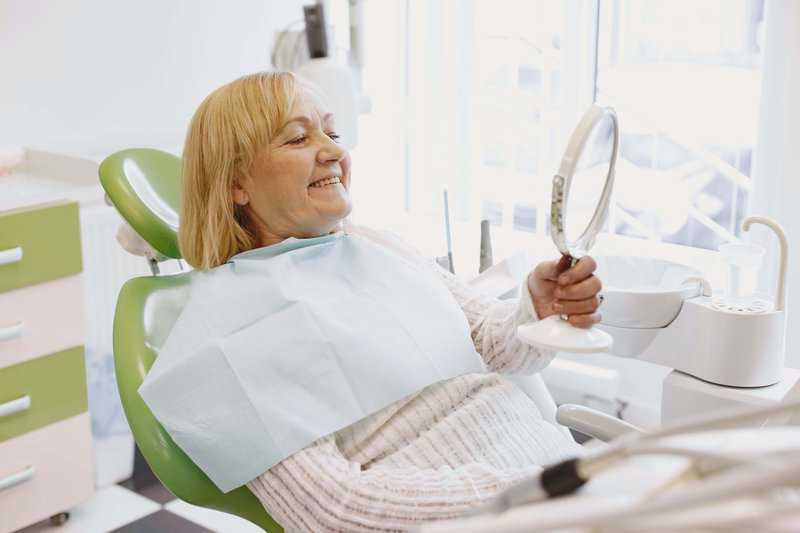As we journey through life, we all hope to maintain our radiant smiles and strong teeth. But the reality is that oral health can change as we age, and more often than not, we need extra support from our trusted dentist in Hermiston to keep our smiles in tip-top shape. So let’s explore some essential considerations for maintaining your oral health as you age, helping you make the most of your dental visits while safeguarding your overall well-being.
- Gum Disease: A Common Concern for Seniors
One of the critical issues to keep in mind as we age is the increased prevalence of gum disease among seniors. Gum disease, also known as periodontal disease, is a bacterial infection that can lead to severe health complications. It starts with inflammation in the gums and can progress to affect various parts of your mouth and face. In some cases, the infection may even spread to other tissues or organs, triggering additional health problems. The elderly are at a higher risk for gum disease due to several factors.
First, as we age, our immune systems tend to weaken, making it more challenging to fight off infections, including gum disease. Second, seniors may be less diligent in their oral hygiene habits, which can contribute to the development of gum disease. To mitigate these risks, it’s crucial for elderly family members and friends to schedule regular dental appointments with their dentist in Hermiston. Visiting the dentist twice a year for a thorough cleaning and examination can help detect and address any signs of gum disease early, preventing more severe complications down the road.
- Increased Risk of Tooth and Jaw Fractures
Aging is often accompanied by a decline in bone density, making seniors more susceptible to fractures, not only in their arms, legs, and hips but also in their teeth and jaws. This is a particularly important consideration as tooth and jaw fractures can have serious consequences. For many seniors, tooth loss is a common occurrence, often due to the shrinking of jawbones and other factors. When seniors are unable to bite correctly and don’t wear dentures as prescribed, their risk of experiencing a fracture increases significantly.
Fractures in the teeth or jaw can expose the affected areas to harmful bacteria, potentially leading to infections. These infections can spread rapidly and put pressure on nearby nerves, resulting in excruciating pain and discomfort. For seniors, this type of infection is especially risky as their immune systems may already be compromised by other age-related conditions, such as diabetes or heart disease. To reduce the risk of tooth and jaw fractures, it’s vital for seniors to consult their dentist for regular checkups and guidance on maintaining healthy teeth and jaws.
- The Link Between Oral Health and Whole-Body Health
It’s a common misconception that oral health is entirely unrelated to overall health. However, research suggests that the two are interconnected, with evidence pointing to a potential link between gum disease and systemic health issues. Studies have shown that gum disease may be associated with atherosclerosis in large arteries, increasing the risk of cardiovascular events such as heart attacks and strokes. This underscores the importance of regular dental checkups for seniors, as these visits can help monitor teeth for signs of decay or gum disease.
Without regular dental checkups, gum disease can progress silently, causing irreversible damage. Early detection and treatment are essential to prevent tooth loss and other dental or whole-body complications. Therefore, visiting your dentist in Hermiston at least twice a year becomes even more important, as it can help ensure your oral health is closely monitored and any issues are addressed promptly.
- The Impact of Missing Teeth on Overall Health
While not every senior will lose their teeth, it’s a relatively common occurrence. In fact, statistics show that among people aged 65 and older, 51 percent of men and 66 percent of women have lost all of their teeth. The absence of teeth can have far-reaching implications on both oral and overall health.
Seniors who are missing teeth often experience a diminished sense of taste, which can affect their enjoyment of food. Additionally, they face an increased risk of pneumonia, as the absence of teeth may make it more challenging to manage saliva and prevent aspiration of bacteria into the lungs. Furthermore, seniors with missing teeth are at a greater risk of choking on solid foods. To mitigate these concerns, there are solutions available, such as dentures, dental implants, and implant-retained dentures, which can help replace missing teeth and support overall health.
As we age, our oral health may require more attention and care. Regular dental visits with your dentist are essential for maintaining a healthy smile and safeguarding your overall well-being. By addressing issues like gum disease, the risk of tooth and jaw fractures, and missing teeth early, you can enjoy a vibrant smile and a healthier, more comfortable life as you age. Remember, oral health is intrinsically linked to your overall health, and nurturing both is key to a fulfilling and vibrant life in your golden years.

